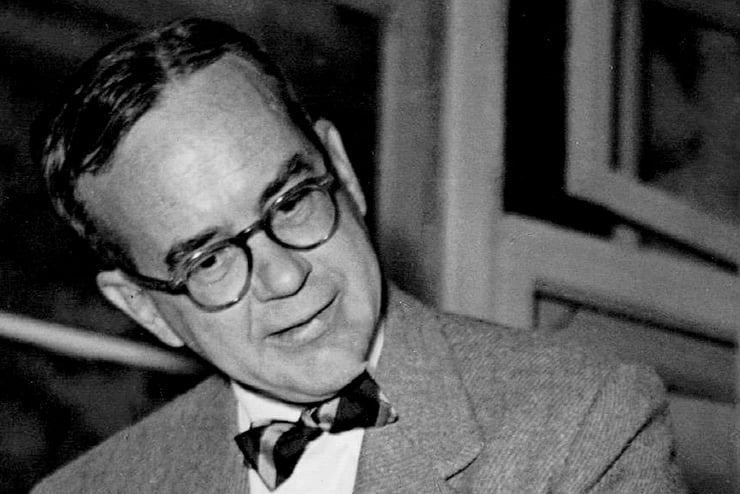Professor Levine writes knowledgeably about Burnham’s abilities to analyze America during the Cold War and his predications about the American future. Burnham has remained fashionable within the independent American right. The part of Burnham’s oeuvre valued by this segment of the right are his analysis of managerialism as an historical phenomenon and his clear-headed look at the role and inevitability of elites, as described especially well in The Machiavellians.
Burnham is an admired figure at Chronicles and his work is inspiring a new generation of paleoconservatives. His influence on our editors appears in, among other places, my books on the administrative state, our former columnist Sam Francis’s brilliant commentaries on the American managerial class, and Associate Editor Pedro Gonzalez’s columns on manipulation and dissembling within the Republican Party. As a political and social critic, Burnham lives on at our magazine.
We may show greater enthusiasm for Burnham’s achievements than the conservative establishment does—and for good reason. Although establishment conservatives have dutifully recognized Burnham as a staunch Cold War Warrior who came from the left, his perspective is clearly at odds with the beliefs of those who advocate a human rights-based foreign policy.
Burnham was averse to all ideologies and opposed the Communists and the Soviet empire so fiercely because he identified them with what Burke characterized as an “armed doctrine.” He despised political fanaticism and revolutionary fervor and did not believe, even when he was a self-declared Marxist, that one could ever achieve an egalitarian society. What he saw as more likely was that in attempting to create such a dream world, one would produce an oppressive tyranny.
Although Burnham did not live to see the ascendancy of woke culture and woke politics, neither would have surprised him. The combination of egalitarian fantasy and managerial control, Burnham would have understood, produced grotesque consequences, among which abolishing gender distinctions and declaring war on whiteness may not be the most extreme. Even worse may be yet to come, unless we strip ourselves of the illusions that Burnham discusses without blinkers in The Machiavellians and Suicide of the West.
What may not be known even among his devotees, who may be tempted to associate him with “Machiavellian” thinking in the common sense of dishonest tactics, is that Burnham, like Francis, was a profoundly moral thinker. Although he feared that human beings would remain trapped in utopian illusions, he still hoped to free them from their hallucinations. In much of his work he seems to almost plead with his readers to look at humanity and world politics more realistically, and to cease imagining that human beings could be transformed if enough prodding and twisting took place. Burnham identified the utopian escape from sober thinking as the “leftist gestalt,” and his disciple Sam Francis reused that term to designate those who succumbed to this mentality, not least of all among his fellow conservatives.
An aspect of Burnham’s life that may bewilder his adepts is the glaring incongruity between his politics and his somber worldview. For more than a decade after he left the Trotskyite wing of Communist movement in May 1940, Burnham remained a social democrat or somewhere on the left-center of the political spectrum. The Congress for Cultural Freedom, which he helped found in 1950, was an international association of generally progressive artists and writers who opposed the Soviet dictatorship and its support system in the West. In 1964, when most of the editors at National Review were promoting the candidacy of Barry Goldwater for president, Burnham rallied to the candidacy of the liberal Republican Nelson Rockefeller of New York.
Burnham wrote most of his classics when he was politically on the left, and he wrote the darkly reactionary Suicide of the West as a supporter of the Mitt Romney-like Governor Rockefeller. Because of his combination of anti-Communism with center-left or centrist politics, Daniel Kelly in his biography, James Burnham and the Struggle for the World (2002) associates his subject with a neoconservative worldview. “The neocons won’t exactly welcome that connection,” Sam Francis observed after he read Kelly’s attempted linkage. On the conceptual and theoretical level, there was no common ground between Burnham and those in whose company Kelly tried to place him.
It’s hard to reconcile entirely the contradictions in Burnham’s politics with the ideas in his books. Understanding how he viewed the events of his day, however, can help us see how he justified what may seem to us as inconsistent. He was convinced that the managerial revolution was irreversible and that a purer capitalism would be replaced by a welfare state economy. Government would be necessarily collectivist, and it was the task of realists to work within this historically determined framework. He also believed that Goldwater’s efforts in 1964 to roll back welfare measures were doomed to failure, and that the only kind of Republican who could win the presidency was someone who totally embraced the New Deal legacy.
Finally, Burnham, in defending his endorsement of Rockefeller, stated that any Republican nominee would be more anti-Communist than Lyndon Johnson, who was the Democratic incumbent. He was therefore throwing his support behind the Republican who was most likely to prevail in the 1964 election.
Although one may question Burnham’s choice of presidential candidates, or whether Rockefeller was more anti-Communist than Johnson, he did make sporadic efforts to clarify his political positions. Whether that explanation entirely dispels our befuddlement is another matter.
But there is no questioning Burnham’s brilliance as a political thinker. In any survey of the post-World War II conservative movement, he stands out as an aloof titan, who bestrode the political theoretical stage and left behind a legacy of thought that continues to enrich the present age.
James Burnham (Intercollegiate Studies Institute)
